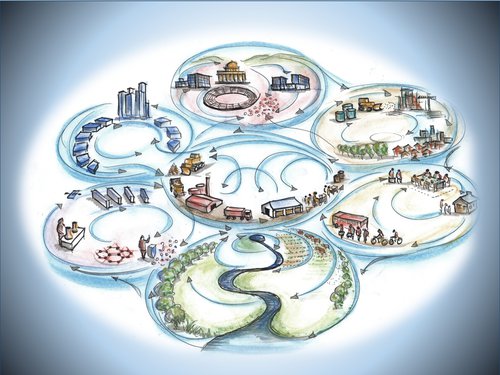UPDATE & LAUNCH INVITATION
‘Beyond & between - launching the global compendium of Peri-Urban-Rural Linkages’ at the World Urban Forum
Nov 5th 1630-1730 EEST, Urban Library room B:
https://wuf.unhabitat.org/event/wuf12/beyond-between-launching-global-compendium-peri-urban-rural-linkages (remote access via the WUF12 app
The PURL Compendium is based on the Peri-cene and its unique Library of Case Studies. The compendium, aka 'Beyond & Between', now focuses on the ‘linkage’ theme, with best practice examples for guidance & inspiration.
This contributes into the UN Habitat 'URL' program and Compendium series, e.g. Compendium-Of-Inspiring-Practices-On-Urban-Rural-Linkages
The 'Key Highlights' summary version is available - PURL compendium key highlights
The event also proposes the Global Peri-Urban Initiative as on www.periurban.in

THE PROJECT
The Peri-cene project provided the first ever global assessment of peri-urbanisation, with its climate impacts, risks and vulnerabilities.
We worked with stakeholders in policy dialogues, to explore the nature of this complex problem, and possible ways forward. We hosted the co-creation of 'adaptive pathways' in a Policy Lab of 18 city-regions from around the world. We provided a new level of peri-urban mapping with an interactive - P-CAT tool. And we looked in some detail at contrasting Case studies: from the global south in Chennai (India), and Manchester Region (UK).
For the overall findings, see the Synthesis Reports -
Peri-cene - Summary for Policy Makers
Peri-cene - Synthesis A - Overview
Peri-cene - Synthesis B - Compendium of Cases
These & other deliverables are all in Project resources .
For more on the project - see the project flyer and slides, and visit About the project
For more on the organizations and researchers involved, visit Partners and funders
Front page image: by Rémi Kaupp CC-BY-SA (http://creativecommons.org/licenses/by-sa/3.0/)
BACKGROUND
In many parts of the world peri-urban settlements, both rich and poor, lie directly in the path of disruptive climate change - for example -
- hurricanes in Central America and South East Asia
- wildfires in Australia and California
- fluvial flooding in the UK and other parts of Europe
Much peri-urban development also reduces the capacity and resilience of its host city -
- coastal mangroves are cleared to make way for hotels and golf courses
- historic water management systems are filled in
- forests see invasive development, with disruption of natural fire cycles
On the positive side, there are great examples of rebuilding the 'eco-urban' resilience. Such 'adaptive pathways', aim to combine new forms of ecological stewardship, collaborative governance, agro-ecological farming, digital technology, integrated water management, local jobs and livelihoods, low impact coastal defence, and so on.
With peri-urban areas doubling in size (1990-2015 data) around the world, there is an urgent challenge to steer them towards resilience and sustainability.
PERI-CENE KEY FINDINGS
a) Where is the peri-urban?
The peri-urban is broadly, the area in the gravity field or hinterland or influence of urban areas: there are many ways to define this: e.g. population density, economic activity, travel patterns, urban infrastructure, water or bio-regions.
As defined by the Peri-cene method, peri-urban areas include land within the ‘functional urban area’ (FUA) at densities of 0-300 persons/km2: & outside the FUA, 50-300. This covers a wide range of types: from the dense desakotas (urban-rural combinations) of South East Asia, to post-industrial UK and Europe, to the extended edge cities of North America and similar around the world.
b) How big is the peri-urban & how is it changing?
Drawing from our 10% global sample, total peri-urban land around the world could be in the order of 1.8 million km2 (approx. the size of Mexico). The rate of growth is around 3% of this, in the region of 60,000 km2 per year (approx. the size of Ireland).
Peri-urban land areas overall have doubled in 25 years (urban land areas are slower growing at 9%). Meanwhile peri-urban populations have increased by 22% (urban area populations by 37%); this shows a smaller population spreading out, while the majority are still expanding and infilling urban areas.
c) Which climate risks are most crucial?
62% of our sample were in areas with ‘high hazards’ in over 3 multiple categories (World Bank data).
- Peri-urban impacts on climate change ‘hazard’: Peri-urban development leads to destruction or degradation of ecosystems (forests, water bodies, soils, mangroves etc) which protect urban areas from climate-related events or stresses.
- Peri-urban impacts on ‘exposure’: peri-urban population growth in areas of high risk (fire, flood, landslides, cyclones, coastal zone etc): many in informal settlements lacking infrastructure or defences:
- Peri-urban impacts on ‘adaptive capacity’: dependency on critical but vulnerable infrastructure: social vulnerability: lowers population density where defence is more difficult (e.g. fire risk zones): urban centred economic development leads to disruption or bypassing of lower income livelihoods, which increases social & ecological vulnerability.
- Peri-urban impacts on ‘governance’: governance is typically fragmented in political units, lacking connection to ecological zones: collaborative governance is more difficult, with a society polarized into higher / lower income enclaves.
d) What can be done?
Starting from the challenges – that the peri-urban is typically between units and policy sectors: climate change is either a short term disaster, or longer term risk and uncertainty. In response we look for a ‘collective peri-eco-urban intelligence’ – the capacity for communication, learning, innovation and co-production between all involved. Then we look to design and plan for one of the 25 adaptive pathways, as co-designed by the Peri-cene Policy Lab:
- Direct and strategic adaptation for flooding, wildfires, drought, sea level rise etc;
- Design thinking and systems approach for food, energy, water, housing, landscape etc;
- Peri-urban-rural linkages and bio-regional ecosystems approach
To support these, we set up adaptive governance systems in each of four tracks:
- Formal government: strategic multi-level, integrated planning & public services
- Market-centred governance: integrating social & ecological values into markets & enterprises
- Civil society governance: collaborative, inclusive, participative forms of partnership governance
- Grassroots social initiatives: enabling the energy of social enterprise innovation & mutual aid.
.
NEWS ITEMS....
‘Beyond & between - launching the global compendium of Peri-Urban-Rural Linkages’ at the World Urban Forum
Nov 5th 1630-1730 EEST, Urban Library room B:
The PURL Compendium is based on the Peri-cene and its unique Library of Case Studies. The compendium, aka 'Beyond & Between', now focuses on the ‘linkage’ theme, with best practice examples for guidance & inspiration.
This contributes into the UN Habitat 'URL' program and Compendium series, e.g. Compendium-Of-Inspiring-Practices-On-Urban-Rural-Linkages
The 'Key Highlights' summary (preview version) is available here
World Peri-Urban Day
Tuesday 1st November 2022
The World Peri-Urban Day follows ‘Urban October’ & World Cities Day 31st October, also just before the COP27, Nov 7-18th.
We launch the newGlobal Peri-Urban Initiative, based in Chennai – along with the completed Peri-cene and related projects, to follow. Then we share ideas on ways forward, form a community of interest, and plan for next steps.
This combined global event starts with 2 sessions, each of 2 hours
- Eastern zones (Australia to Africa) 0800 GMT / 1330 IST:
- Western zones (Europe to the Americas) 1600 GMT / 0800 PST:
Registration – https://www.eventbrite.co.uk/e/world-peri-urban-day-tickets-405286080577
These dates follow 2 international conferences, each featuring the Peri-cene methods & tools, findings & implications ....
World Planning Schools Congress: Bali, 29 Aug - 2 Sept
- Workshop: ‘Breakfast with monsters’: how to use the synergistic toolkit for urban & regional resilience ; Based on the Peri-cene project https://peri-cene.net
- Paper: Fire & flood in the ‘peri-anthropocene’: exploring the potential of ‘transformative adaptive pathways’
UK-Ireland Planning Research Conference:
https://psfuk.wordpress.com/prc-2022/
This is on-site in Manchester, historic city of the industrial revolution and post-industrial co-evolution: and it coincides with the Department of Planning and Environmental Management’s 70th anniversary.
- Workshop: ‘the new global peri-urban Anthropocene: theory and practice’
- Paper: Cities (but not as we know them): on the frontline of the ‘peri-anthropocene’
Meanwhile...
Congratulations to Dr Mehebub Sahana on his new Leverhulme Early Career Fellowship
He is now based at the School of Environment Education & Development at the University of Manchester, working on 'Landscape, Environment and the People: Ecological Spoils of the Bengal-divide' - a unique study of the effect of the Partition on the Bengal Delta, the world's largest system of river-ocean interactions.
Also - congratulations to Amanda Winter and Andy Karvonen of KTH Stockholm, for the first published paper coming from the Peri-cene: Climate governance at the fringes: Peri-urban flooding drivers and responses. Land Use Policy 117 (2022)
.
PREVIOUS ITEMS.....
Peri-cene film screening & round table:
‘Urbanization, Disaster Risk Reduction & Adaptive Pathways: Chennai in global context’
A plenary session hosted at the Centre for Disaster Management Studies international conference - https://cdmssbsc.org/international-conference.php
- April 5th 1200 BST / 1630 IST
- information & link to join Peri-cene film & round table
Climate change / all change on the new frontiers
May 6th, 1600 BST
With the peri-urban as a new frontier between natural and human systems, with areas doubling in 25 years, adaptation to fire & flood calls for transformation pathways, far beyond the normal scope of policy / research.
The current geo-political conflict / instability is a further ‘threat multiplier’, for both mitigation & adaptation.
Can we build the ‘collective eco-urban intelligence’ needed for these ‘transformative adaptive pathways’? This round table introduces the Peri-cene (peri-eco-urban anthropocene) and follows up the COP26 ‘reality testing’ program - www.manchester.ac.uk/synergistics/climate-wise/ . Then we can begin to explore ways to turn crisis into opportunity.
Other activities....
- Keynote at the 'Pivot peri-urban frontiers' project conference – Revisioning peri-urban futures – Oct 2nd 2021
- Keynote at the International Forum on Urban-Rural Linkages (from the UN Habitat URL program) – Oct 19th 2021 – Songyang, China & online
- Interactive session at the international Bioregional Planning Conference – Oct 20th – Firenze Italy & online
“Rural-Urban Connectivity”
5th ICPEU (International Conference Planning in the Era of Uncertainty)
July 19 2021:
- keynote on: ‘The ‘anti-city-region’ – what it is and what to do?‘ http://johannes.lecture.ub.ac.id/2021/04/the-5th-international-conference-planning-in-the-era-of-uncertainty-the-5th-icpeu-2021/
Mapping Indian risk & resilience
India has more than its share of natural and human challenges, and 2 recent events explored the agenda for adaptive & synergistic pathways…
International Conference on Challenges of Disasters: Vulnerability, Adaption and Resilience - 2-3 March, including ‘valedictory address’ by Joe Ravetz... This explores the human dimensions of DRR, and pathways for a ‘collective resilience intelligence’.
also, in a plenary lecture for the Indian National Cartographic Association, Feb 10th - www.INCA2020.org – we explored the role of digital mapping in society. We looked at examples of mapping for local community development, mapping for sustainable futures, and mapping for peri-urban risk & resilience.
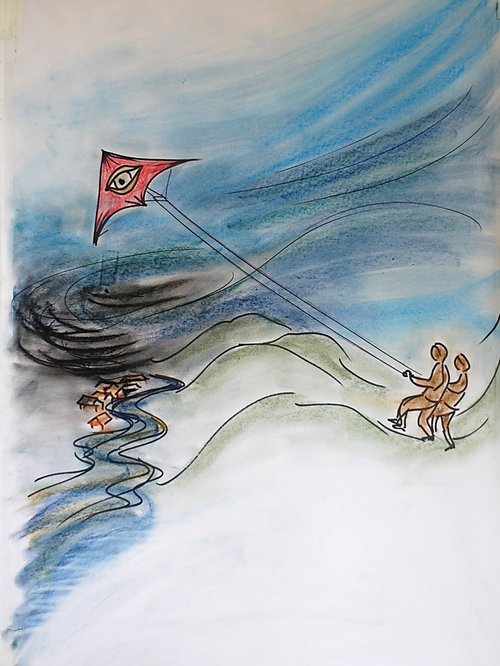
1st Mediterranean Climate Assessment Report
The MedECC climate project on the Mediterranean area has just won jointly (with the International Commission against the Death Penalty), the "2020 North South Prize of the Council of Europe".
This is a fantastic recognition of the MedECC Coordinators and MedECC Science Officer in particular, together with the MedECC Lead Authors and Steering Committee.
This is the initial release - "the 1st Mediterranean Assessment Report entitled “Climate and Environmental Change in the Mediterranean Basin - Current Situation and Risks for the Future” prepared by MedECC, the independent network of Mediterranean Experts on Climate and environmental Change founded in 2015, is released today." (Lead authors include Joe Ravetz of the Peri-cene). The report is available via this link: <https://www.medecc.org/first-mediterranean-assessment-report-mar1/>
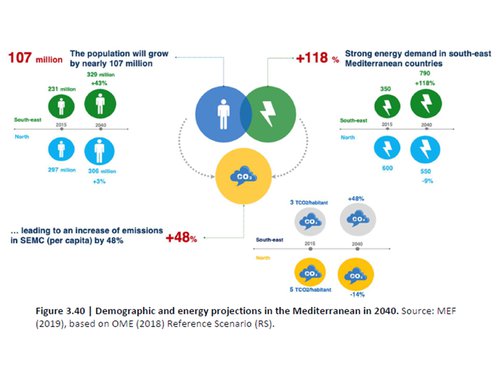
City & Region program
The City & Region seminar series is hosted by the Auroville Institute for Sustainable Architecture, together with the Indo-German Centre for Sustainability, Tamil Nadu, India https://www.facebook.com/EngagingCitiesInitiative/
The session on 18th September presented the Peri-cene ideas with interactive polling and indepth discussion. It seems that conventional models of ‘resilience’ or ‘adaptation’ are not enough in the face of deeper and wider challenges – we need transformational models to get the science/tech, economics, politics, culture and psychology all working together – a kind of ‘collective resilience intelligence’. It’s also possible that historic ideas on inner harmony, can be translated into eco-design principles. Presentations & background papers are on https://www.dropbox.com/sh/fnvztutg85k8k1j/AACqlche8HgcoQcdGpe8f19va?dl=0
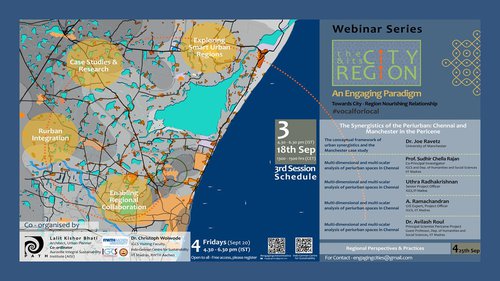
IGNITION project
The ground-breaking IGNITION project gets under way - https://naturegreatermanchester.co.uk/ground-breaking-ignition-project-gets-under-way/
Partners across the city-region have signed a multi-million pound European contract for a project which looks to develop innovative ways of financing natural solutions to deliver resilience to increasingly extreme climate hazards. IGNITION will run for up to the next three years backed by £4 million from the EU’s Urban Innovation Actions initiative, in a significant announcement made a week after the Mayor of Greater Manchester’s second annual Green Summit. There is much cross-over with the Peri-cene project, which focuses on the peri-urban trans-boundary issues in GM and beyond, with a focus on longer term climate change risk and resilience.
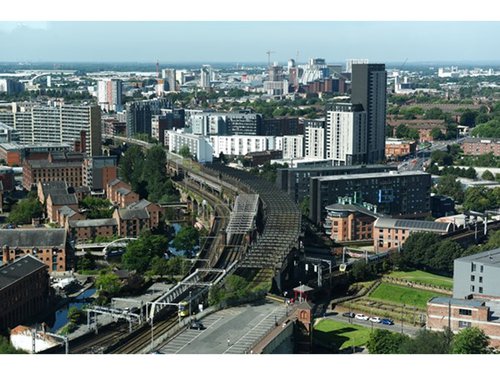
LOOPER project
The Learning Loops in the Public Realm www.looperproject.eu - concluded in October with a joint launch event - https://www.polisnetwork.eu/event/mobilising-mobility-towards-sustainable-mobility-one-neighbourhood-at-a-time/ - combined with a Loco-gov-3.0 Synergistic Conversations
This project is highly relevant to the governance theme of Peri-cene – i.e. how does collaborative governance or ecological stewardship really work? how to structure debate and decisions at multiple levels, on complex issues of risk and resilience, with large numbers of stakeholders? Can the digital platform help with ‘learning loops’, where communities and policy-makers can learn about problems and solutions in a positive structured way?
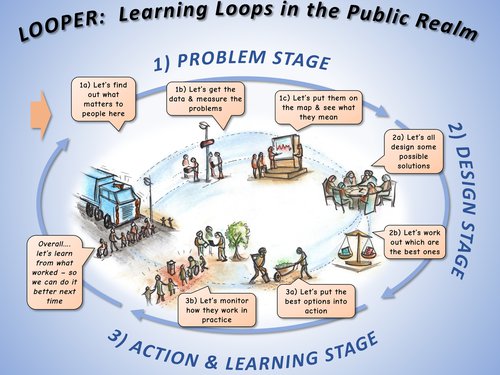
Deeper City launch
For the Peri-cene challenges of climate change, sprawling cities, dysfunctional governance – there are powerful insights from the new book Deeper-City-Collective-Intelligence-and-the-Pathways-from-Smart-to-Wise (with background on Synergistics). This explores the workings of such deeper challenges, with wider communities and further transformations. Deeper City maps in practical detail the collective intelligence of cities, economies, technologies and so on, with the help of creative visual systems thinking – for instance we see here the circul-onomics principles of synergy between economic, social and ecological value….
